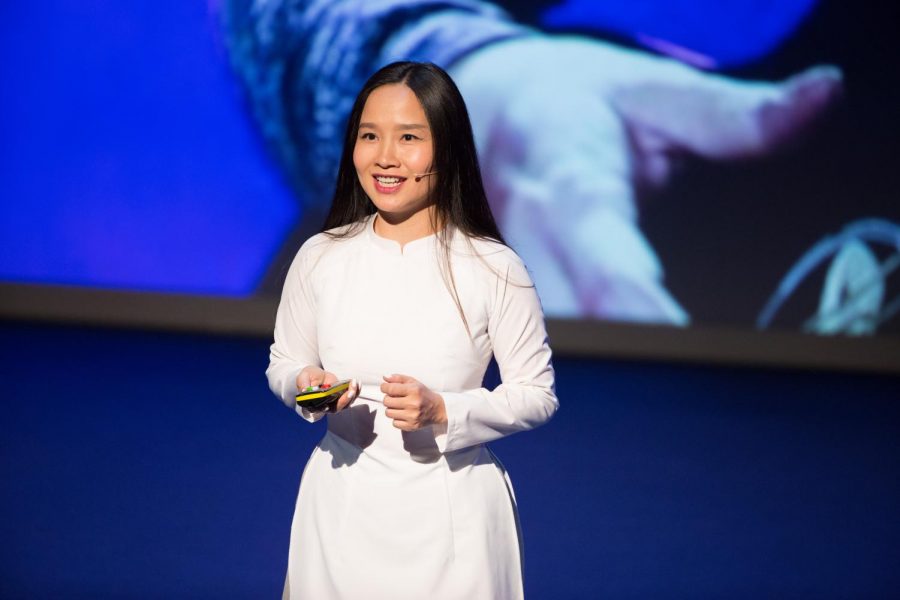Vietnamese pop star and activist Mai Khoi brings talents to Pitt
Mai Khoi is a Vietnamese pop star turned activist who has spoken out against censorship in Vietnam, attempted to run for a seat in Vietnam’s National Assembly and campaigned for Facebook to step in and stop the activities of pro-government censorship groups on the site.
February 15, 2021
Mai Khoi is a Vietnamese pop-star-turned-activist who has spoken out against censorship in Vietnam, attempted to run for a seat in Vietnam’s National Assembly and campaigned for Facebook to step in and stop the activities of pro-government censorship groups on the site.
Now she’s at Pitt, taking classes and creating new work.
Khoi is an Artist Protection Fund fellow in residence at Pitt, and is co-hosted by the City of Asylum and the International Free Expression project. Her residency is supported in part by Pitt’s Scholars at Risk Program, which is administered by the Global Studies Center, part of the University Center for International Studies.
Michael Goodhart, the director of the Global Studies Center and a political science professor, said the aim of the program is to help scholars who are unsafe in their home countries and bring them to Pitt so they can study and work on research.
“The scholars at risk program started formally, at least in its current iteration, in 2019 and our first scholar professor Simten Coşar joined us in January of 2020,” Goodhart said. “The program is designed to bring scholars who face threats because of their work or political views in their home countries to Pitt both to teach, to conduct their research and importantly to interact with with students.”
The various organizations and programs that helped bring Khoi to Pitt and give her a space to create all assist individuals for whom, for whatever reason, it is unsafe to continue working in their home country.
In Khoi’s case, she said she got involved in activism to protest the censorship of artists in Vietnam, and only received more scrutiny after she ran for a seat in the National Assembly of Vietnam.
“I feel very sad for my country. The country is destroying [itself] and it lacks freedom. I hope in the future, they will change,” Khoi said, “so the people, the artists like me, don’t feel fear to come back to the country.”
“As in lots of one-party states, criticism of the government is frowned upon, censorship is widespread, access to the internet can be limited,” Goodhart said. “In a one-party state you’re not just like, sign up to run for parliament, they want to keep all the stuff tightly controlled.”
As part of her residency, Khoi has received housing on the North Side from City of Asylum and started taking several classes at Pitt, including courses in improvisation, public speaking, composition and instructional design.
“This is the first time I took class in the University outside of Vietnam,” Khoi said. “I’ve learned many new things. And I’m so happy to have the chance to do these things in this fellowship.”
Khoi said although she is enjoying her time in Pittsburgh, she misses her friends and family back in Vietnam.
“I miss my parents, I miss my friends. Especially this time [of year] is the Lunar New Year time, when everyone comes back to the family to spend time with [their] parents. But people like me cannot do that. And it’s not really happy to talk about that,” Khoi said.
Khoi also began working on the performance piece “Bad Activist,” with the help of City of Asylum and Pitt. Pitt Arts showed it as part of its Artful Wednesday series on Jan. 27, and Khoi said she began working on the show last year.
“I had the idea about making ‘Bad Activist’ one year ago, and I started in the residency in New York last year,” Khoi said. “I had the opportunity to meet with the director, the musicians and the filmmaker in Pittsburgh University and they helped me to make the video of the ‘Bad Activist’ performance.”
Cynthia Croot, the head of performance and associate professor in theater arts at Pitt, helped Khoi with the script.
“When we started out, I thought that I was going to be helping her sort of refine her performance. And in the end, we ended up rewriting much of the script,” Croot said.
In “Bad Activist,” Khoi describes her life and personal journey through a series of monologues and songs, with sections in both English and Vietnamese.
“We felt like it was really important for her to be able to speak in her home language,” Croot said. “There’s a different kind of connectedness a performer has, I think, to the language they were born into. I think it allows them for quicker processing of information for your expression of emotion, of greater sense of spontaneity.”
Khoi said the music featured in “Bad Activist” reflects a variety of styles to match the story, which depart from the pop music she started out singing.
“Because ‘Bad Activist’ is the storytelling and the music is going along with the story, different styles of music will express different emotions, different transformations of the story. I think one style of music cannot do that,” Khoi said.
Khoi blended a variety of styles, such as jazz, protest music, electronic and traditional Vietnamese music in her show. Croot said she was impressed with Khoi’s work and the new directions she is taking her music.
“She’s musically, sort of an extraordinary artist, in terms of the way that she’s synthesizing traditional music from Vietnam, as well as contemporary jazz and protest song,” Croot said. “It’s a very innovative and dynamic space that she’s sort of mapping out in terms of her music.
Keith Reimink, a graduate student at Pitt in the School of Education and a media production intern for the Global Studies Department, acted as both cameraman and editor for the video. He spoke about what it was like to work on the video with Khoi, and how she gave him a lot of independence.
“We filmed it at City of Asylum here in the North Side,” Reimink said. “We went back and forth about some editing choices and some things that she wanted to include, because she has people that would be looking for those things. But, you know, a lot of the choices and the decisions were mine.”
“Bad Activist” reflects a lot of the beliefs Khoi advocates for her activism, according to Croot.
“Her work has, at its heart, I think, the desire for the artists to be heard, to rail against injustice, to give voice to those who cannot speak up,” Croot said.
According to Reimink, Khoi and the rest of the crew who worked on “Bad Activist” are currently looking to expand the show and perhaps take it on tour after the pandemic ends.
“The mode that we’re in right now is finding funding to expand the project because she wants to work with other musicians and expand the band here and all of that,” Reimink said.
Khoi hopes she can reach a large variety of people with her music, and inspire others.
“With this project, I really hope that I can meet more people, more artists, more activists, receive more support, more help and more connections,” Khoi said. “I wish I can tour with ‘Bad Activist’ in the near future and bring that message to people around the world. Not just only Vietnamese [people].”




